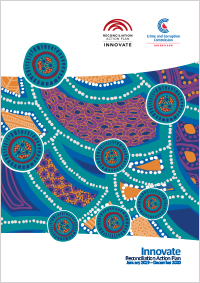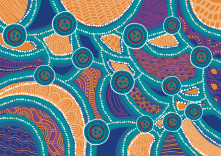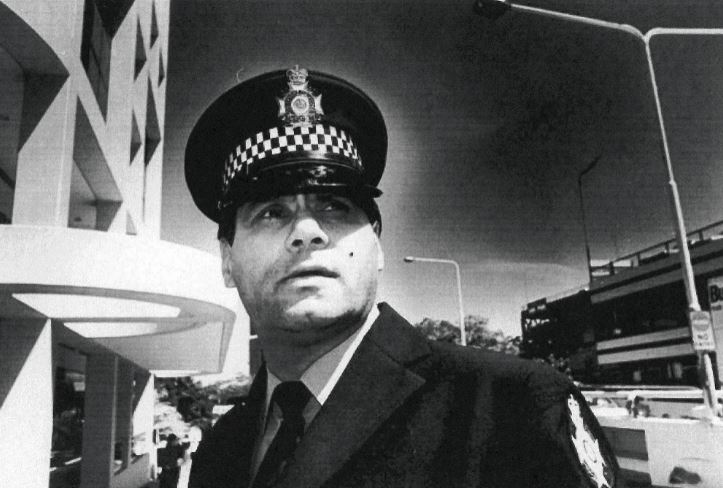 Our vision is to partner with Aboriginal and Torres Strait Islander peoples to form lasting relationships based on mutual trust, respect and understanding in order to support our commitment for all Queenslanders to feel safe in the communities in which they live.
Our vision is to partner with Aboriginal and Torres Strait Islander peoples to form lasting relationships based on mutual trust, respect and understanding in order to support our commitment for all Queenslanders to feel safe in the communities in which they live.
Note: This document was last updated in January 2020.
In October 2017, Queensland’s Crime and Corruption Commission (CCC) reaffirmed that its engagement with Aboriginal and Torres Strait Islander peoples was a priority in terms of its policies and services.
I am very pleased that this Reconciliation Action Plan will be a purposeful guide during our ongoing Journey of Reconciliation. The voices of Aboriginal and Torres Strait Islander peoples are central to ensuring that our engagement is culturally appropriate.
The Listening Tours that I have had the privilege of being part of over the last two years have taken us to remote and rural areas of Queensland. Our visits enabled us to gain a person-to-person understanding of the current and potential challenges and issues facing Aboriginal and Torres Strait Islander peoples. What we learned on those visits has helped us consider how the CCC may assist in resolving those challenges.
The CCC Innovate Reconciliation Action Plan January 2019 – December 2020 gives us a framework within which to design and deliver unique and practical services and support to Aboriginal and Torres Strait Islander Queenslanders, and support the national reconciliation movement.
We know more can be done to deliver greater respect and trust between the CCC and Aboriginal and Torres Strait Islander peoples. The RAP will give us further opportunities to listen and learn, and guide our agency in delivering unique services. Most importantly, those services will be developed in partnership with Aboriginal and Torres Strait Islander communities.
We believe developing and implementing our Reconciliation Action Plan, which embraces carefully considered actions and practical deliverables, is a major step forward for the Commission. It is a journey that we are proud to take and share with Aboriginal and Torres Strait Islander Queenslanders.
Alan MacSporran QC
Chairperson Crime and Corruption Commission

To us, this is more than vibrant imagery. To us, this is a central part of our reconciliation journey.
As we developed our RAP, we wanted to ensure that we communicated our RAP in both words and images.
The Aboriginal and Torres Strait Islander design depicts the journey of Reconciliation of the Crime and Corruption Commission. The journey begins with CCC staff moving among Aboriginal and Torres Strait Islander communities and listening, to hear the stories for ourselves. Importantly listening with respect to the past and learning from the lessons shared by Aboriginal and Torres Strait Islander communities to effect and build lasting change for the future.
![]() The CCC’s Indigenous icon represents the Commission’s commitment to Reconciliation through deliverables in the key target areas of Relationships, Respect and Opportunities. This icon is symbolic of the consultation where the Commission sits, listens and respects the Aboriginal and Torres Strait Islander issues with regards to crime and corruption.
The CCC’s Indigenous icon represents the Commission’s commitment to Reconciliation through deliverables in the key target areas of Relationships, Respect and Opportunities. This icon is symbolic of the consultation where the Commission sits, listens and respects the Aboriginal and Torres Strait Islander issues with regards to crime and corruption.
The artist
Designer Leigh Harris from Cairns-based Indigenous digital creative agency ingeous studios is a proud Kangoulu, Gungarri man who is also proud of his mixed Italian and Welsh heritage. Leigh’s design work has been a process of many years as an industry specialist and is strongly influenced by his heritage as inspired from traditional and contemporay styles, drawn from his rich knowledge of Country and Culture.
Watch this short video about the genesis and future of our Reconciliation Action Plan (RAP), and the symbolism and significance of the artwork.
On 30 September 2019, the CCC completed Reconciliation Australia’s annual Impact Measurement Questionnaire which included 41 questions to evaluate the CCC’s progress against the RAP commitments. The CCC continues to progress a large number of actions as part of the RAP, with a current focus on raising awareness of the CCC RAP within the agency and increasing staff participation in events.
Since 2017, the CCC Chairperson and members of staff have personally visited Aboriginal communities across Queensland – from Aurukun to Thursday Island, and many communities in between – and met with Aboriginal and Shire Councils and schools to discuss their issues of importance.
Through our RAP, the CCC has committed to a number of deliverables which are underpinned by building on our existing capabilities to further develop and foster trusting relationships with Aboriginal and Torres Strait Islander peoples.
Indigenous internship program
The CCC supported an Indigenous law internship for a student during the summer of 2019-20. The third-year law student was placed in a 12-week internship from November 2019 to February 2020, gaining valuable work experience across four divisions within the CCC during that period.
The origins of the CCC date back to the landmark Fitzgerald Inquiry in 1987 which investigated police corruption in Queensland for the first time. The culture of police at that time meant officers were reluctant to speak up about corruption. However, it was the strength of Col Dillon, an Aboriginal police officer that changed the corrupt police culture forever.

Col joined the police in 1965, two years before the referendum that led to Aboriginal and Torres Strait Islander peoples being counted in the census. He experienced racism within the police but was committed to serving the community and went on to be the highest ranking Aboriginal police officer in Australia.
Col was an honest cop and a man of integrity. When he was offered cash bribes and a bottle of alcohol from his colleagues to act corruptly, he rejected the bribes and knew he had to speak out about corruption. When Col spoke to the Fitzgerald Inquiry, he provided evidence that contributed to many corrupt police officers being charged with serious offences and they were dismissed from the Queensland Police Service.
In the spirit of reconciliation, the CCC acknowledges the Traditional Custodians of Country throughout Australia. We acknowledge that Aboriginal and Torres Strait Islander peoples have unique cultures, languages and connections to the land, seas and waterways of Australia. We also pay our respect to their Elders - past, present and emerging - for continuing to share with us the stories, song lines and traditions of Aboriginal and Torres Strait Islander culture.
